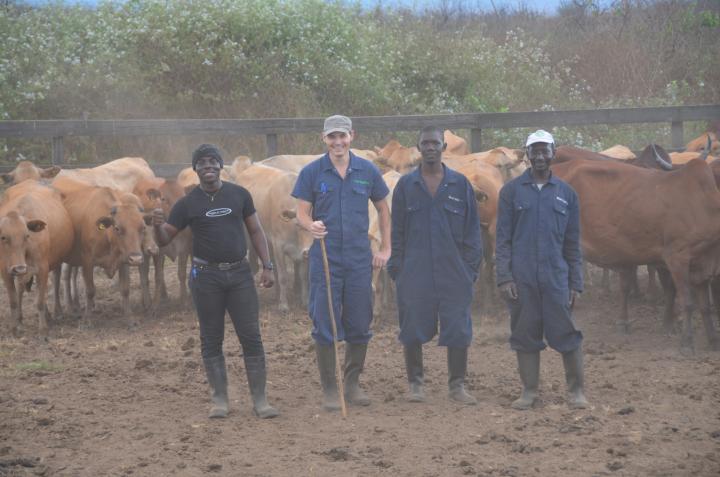Brieuc Cossic (MSc IAH, 2015 Winter Graduation)
I have always known that I wanted to work at the international level on collaborative projects with other scientists, and thus the “One Health” approach was very attractive, not only for the level of science it fosters, but also for its direct applicability and the solutions that it may provide to people and animals worldwide.

I have also always been fascinated by infectious diseases and the solutions that we can develop to improve their management. After graduating from veterinary school at the University of Liege (Belgium) in 2012, I decided to continue studies in the field of International Animal Health (IAH) alongside my job as a veterinarian in a cattle ranch in the South of Gabon.
As someone with a strong interest in production animals, the program offered by the IAH was very appealing. I chose to study at the University of Edinburgh because of the reputation of its programmes, as well as the flexibility offered by the distance-learning option. I was able to pursue my education in a very exciting field, while readily applying my newly acquired knowledge to my everyday work.
All the supervisors and lecturers of the program, and especially Dr. Ewan MacLeod, were extremely helpful and encouraging, offering high quality courses with challenging and stimulating questions. Even though English is not my first language, since many assignments were text based, I was able to take my time going through them. I also enjoyed the diversity of written assignments and the opportunity to share very interesting topics with the other people enrolled in the programme through the discussion boards. I found it fascinating and incredibly beneficial to discuss topics with other students in the class and learn how things are done in numerous different countries.
For my dissertation, I chose to work on trypanosomiasis in cattle, combining epidemiology and parasitology. I wanted to learn more about the prevalence in my herds in the cattle ranch in Gabon, with a goal of adapting prophylactic schemes. The results were interesting and led to the publication of a peer-reviewed article with a portion of the data.
My supervisor for this project, Dr. Kim Picozzi, was always available and helped me a lot with the production of the final dissertation and the paper. I think that my experience with the University of Edinburgh helped me to gain a residency in anatomic pathology at Cornell University in the USA. During my residency, I have been able to apply many of the skills and knowledge previously acquired with the IAH program. I am now in a position to directly apply my skills in pathology and what I have learned with the MSc to the field of One Health and provide a real expertise when and where it is needed. I am currently exploring the possibilities of digital pathology and telepathology to provide solutions in the most remote areas.
I would highly recommend this program to anyone looking for further education in the field of International Health and One Health while still being able to work. The program offers a lot of flexibility and high-quality learning materials and is a great way to network with people from all around the world with similar interests. As new challenges arise, the need for veterinarians trained accordingly will follow and the MSc in International Animal Health is in my opinion a wonderful chance to obtain this training.

